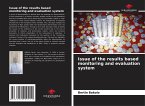Over decades, there has been an increase in the use of the New Public Management (NPM) inspired reforms including results based management (RBM). Unlike in OECD countries, in most developing countries however, the RBM seems to be in disappointing situation. In Tanzania for instance, its adoption in the public sector has only been partially implemented. This book therefore, provides the findings as to why it has been that way. Moreover, there are still some challenges in the adoption of results-based approach such as budget deficit, weak capacity to carry out the reform as well as lack of political will to some extent. Governments should therefore increase their budgets and pressure on the use of performance indicators. Capacity building on the other hand should also be considered on high regard for public sectors to cope with modern managerial standards specified in the NPM model.








